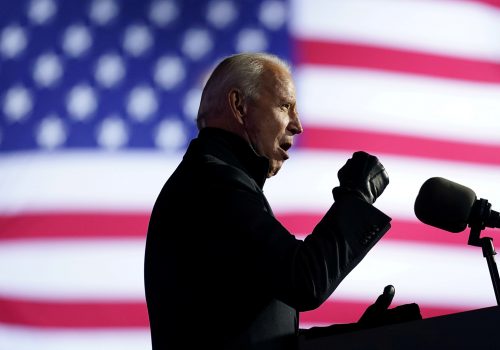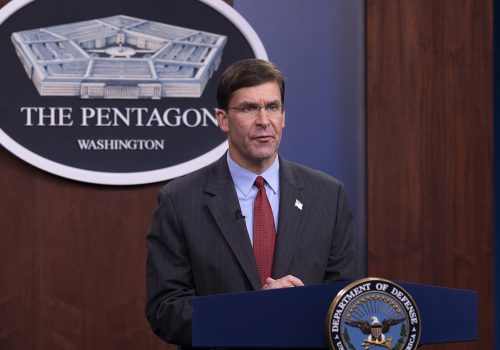FAST THINKING: Trump fires his defense secretary
JUST IN
Two days after losing his bid for re-election, President Trump has removed Mark Esper, whose run as defense secretary was marked in its final stages by his defiance of Trump—on the idea of sending US troops to quell protests against police brutality and even on the question of wearing masks during the pandemic. How will his departure contribute to the post-election tumult? And is his successor likely to push back against the president?
TODAY’S EXPERT REACTION COURTESY OF
- Barry Pavel: Former US national-security official and director of the Atlantic Council’s Scowcroft Center for Strategy and Security
- Tom Warrick: Former Department of Homeland Security official, former colleague of Esper’s replacement, and Atlantic Council nonresident senior fellow
- Chris Skaluba: Veteran of the Office of the Secretary of Defense and director of the Scowcroft Center’s Transatlantic Security Initiative
- Clementine Starling: Expert on transatlantic security and deputy director of Forward Defense at the Scowcroft Center
Why the timing is worrying
- Esper’s replacement is Christopher Miller, who until now has been serving as the director of the National Counterterrorism Center (NCTC). Regardless of Miller’s credentials, Barry writes, this is the wrong move at exactly the wrong time: “a worrisome and potentially dangerous development” that will only make America more vulnerable during a time of upheaval.
- “In normal times, presidential transitions are watched closely by friend and foe alike as they are considered to be fragile periods,” Barry tells us. “And these are not normal times.” In both the United States and Europe, the coronavirus is spiraling out of control while the economy is reeling. China has already been seeking to capitalize on its far quicker recovery from COVID-19 and has been making menacing moves toward Taiwan. And the US election process is still in a precarious state, with court battles looming and the potential for domestic unrest. “For all of these reasons,” Barry adds, “having someone completely new in the position of secretary of defense adds a substantial new element of uncertainty and unsteadiness.”
Who’s the new guy?
- Tom tackles the most pressing question: What can we expect from Esper’s replacement? He tells us that Miller, a US Special Forces veteran, “is well-known and universally respected in counterterrorism circles. His military record is outstanding, even if it was in roles the public doesn’t know much about.” And he adds that Miller, who was approved by the Senate for his NCTC post, has also held senior positions at the National Security Council (he and Tom worked together on counterterrorism issues) and the Department of Defense. Miller has a “creative mind” that could help the country “solve some of our most challenging national-security problems.”
A more skeptical view of Esper’s replacement
- Chris, on the other hand, is wary of Miller’s selection. While Miller is an acknowledged expert on counterterrorism, he writes, “how prepared he is to take on one of the most difficult jobs in Washington, of which counterterrorism is a significant but small part, is unclear.”
- Chris adds that Miller “is viewed inside the Pentagon as loyal to the White House.” He sees Trump’s decision to appoint Miller instead of David Norquist, Esper’s second-in-command, as “an indicator that White House instructions will be strictly followed during the transition to President-elect Biden’s administration.” Logistical and legal constraints make it unlikely that Trump would embark on any radical initiatives in the brief time he has remaining in office, Chris tells us. “Yet passing over Norquist feels ominous.”
The shakeup, viewed from abroad
- Clementine explains that the end of an administration isn’t typically a time for radical change in foreign policy. “The final months of an administration should be spent winding down,” she tells us, “and ensuring a smooth transfer to the incoming team.” Instead, Clementine says, the Trump administration appears to be setting the stage for disruption.
- “There’s still technically room for the Trump administration to enact changes,” she notes. “This new appointment will beg the questions: What might come, and will President Trump try to use the Pentagon to make any shifts that would impact US defense policy and posture for the Biden team coming into office?”
- Trump’s abrupt termination of Esper by tweet will raise concern among US allies “about the management of the Pentagon and potential last-minute initiatives,” Clementine says. In the short time Miller is at the helm of the Pentagon, she adds, the secretary should aim to reassure US allies and partners that the US remains engaged “and make clear that the US will prioritize its key relationships in this period of transition.”
Elsewhere in Fast Thinking today: Check out Josh Lipsky and Julia Friedlander breaking down the market rebound and what it means for America’s economic recovery
Further reading
Sat, Nov 7, 2020
Joe Biden just won the presidency: What does that mean for America’s role in the world?
Elections 2020 By
Atlantic Council experts weigh in on what the outcome of the 2020 election means for US foreign policy and America’s role in the world.
Fri, Nov 6, 2020
America’s commitment to democracy must prevail at home and abroad
Elections 2020 By Daniel Fried
To pass the existential test now before us, we Americans must not only hold fast to our best values at home, but also uphold our commitment to reflecting those values as we look abroad.
Tue, Oct 20, 2020
Defense Secretary unveils a new strategy for bolstering allies and partnerships in an era of great-power competition
New Atlanticist By
As the United States prepares for long-term competition with adversaries such as China and Russia, the Department of Defense is unveiling new plans to strengthen America’s network of alliances and partnerships. “Our global constellation of allies and partners remain an enduring strength that our competitors and adversaries simply cannot match,” US Secretary of Defense Mark Esper said during an Atlantic Council Front Page event on October 20.
Image: REUTERS/Erin Scott/File Photo


